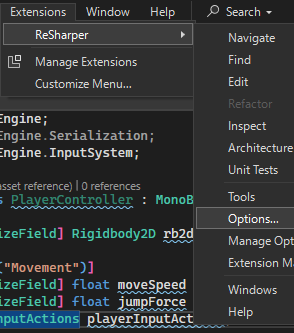Touching up on the fundamentals of c# again by going over a few courses that I bought on Udemy, but never got around. Quick and dirty Tic Tac Toe, bare minimum functional.
internal class Board
{
string[,] _board;
bool _isPlayer1 = true;
string _playerName = "Player1";
string _playerTic = "O";
string _playerSymbol;
public char Selection { get; set; }
public string[,] GameBoard
{
get => _board;
set => _board = value;
}
public Board()
{
_board = new string[,]
{
{ "1", "2", "3" },
{ "4", "5", "6" },
{ "7", "8", "9" }
};
}
public void Run()
{
Console.WriteLine("Welcome to your tic tac toe game.");
for (int i = 0; i < GameBoard.GetLength(0); i++)
{
for (int j = 0; j < GameBoard.GetLength(1); j++)
{
Console.Write("_" + GameBoard[i, j] + "_|");
}
Console.WriteLine("");
}
}
public void ShowBoard()
{
for (int i = 0; i < GameBoard.GetLength(0); i++)
{
for (int j = 0; j < GameBoard.GetLength(1); j++)
{
Console.Write("_" + GameBoard[i, j] + "_|");
}
Console.WriteLine("");
}
}
public void Start()
{
Console.WriteLine($"{_playerName}: It's your turn (enter #): ");
Selection = Console.ReadKey().KeyChar;
Console.WriteLine("_____________________");
Console.WriteLine();
Console.WriteLine();
Select();
}
public void Select()
{
for (int i = 0; i < GameBoard.GetLength(0); i++)
{
for (int j = 0; j < GameBoard.GetLength(1); j++)
{
if (GameBoard[i, j] == Selection.ToString())
{
GameBoard[i, j] = _playerTic;
}
}
}
WinCheck();
ShowBoard();
_isPlayer1 = !_isPlayer1;
if (!_isPlayer1)
{
_playerName = "Player2";
_playerTic = "X";
}
else
{
_playerName = "Player1";
_playerTic = "O";
}
Start();
}
public void WinCheck()
{
_playerSymbol = _isPlayer1 ? "O" : "X";
if (GameBoard[0, 0] == _playerSymbol && GameBoard[0, 1] == _playerSymbol &&
GameBoard[0, 2] == _playerSymbol ||
GameBoard[1, 0] == _playerSymbol && GameBoard[1, 1] == _playerSymbol &&
GameBoard[1, 2] == _playerSymbol ||
GameBoard[2, 0] == _playerSymbol && GameBoard[2, 1] == _playerSymbol &&
GameBoard[2, 2] == _playerSymbol ||
GameBoard[0, 0] == _playerSymbol && GameBoard[1, 0] == _playerSymbol &&
GameBoard[2, 0] == _playerSymbol ||
GameBoard[0, 1] == _playerSymbol && GameBoard[1, 1] == _playerSymbol &&
GameBoard[2, 1] == _playerSymbol ||
GameBoard[2, 0] == _playerSymbol && GameBoard[1, 2] == _playerSymbol &&
GameBoard[2, 2] == _playerSymbol ||
GameBoard[0, 0] == _playerSymbol && GameBoard[1, 1] == _playerSymbol &&
GameBoard[2, 2] == _playerSymbol ||
GameBoard[0, 2] == _playerSymbol && GameBoard[1, 1] == _playerSymbol &&
GameBoard[2, 0] == _playerSymbol)
{
if (_isPlayer1)
{
Console.WriteLine("=============");
Console.WriteLine("Player1 Wins!");
Console.WriteLine("=============");
Environment.Exit(0);
}
else
{
Console.WriteLine("=============");
Console.WriteLine("Player2 Wins!");
Console.WriteLine("=============");
Environment.Exit(0);
}
}
}
}


